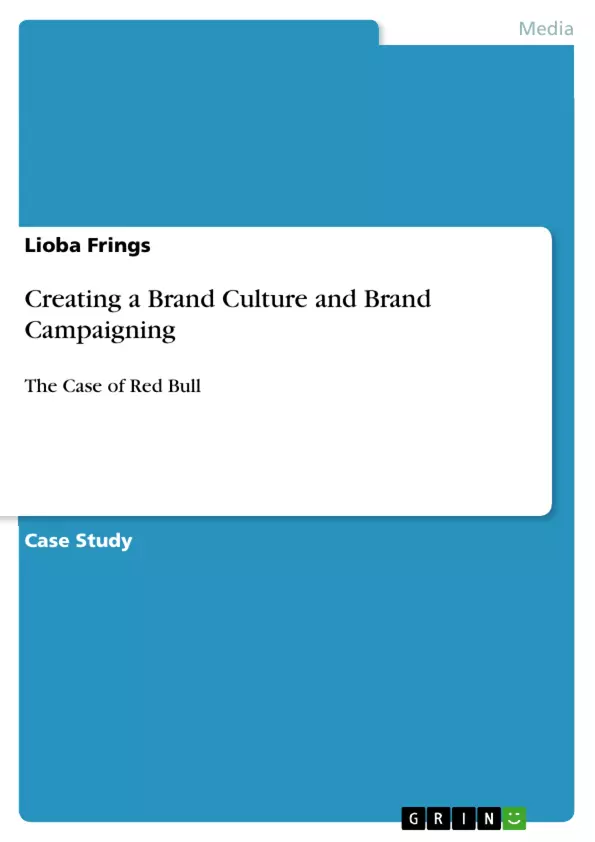“Brands occupy an increasingly prominent place in […] the cultural landscape” (Schroeder et al, 2006). This is why brands need more than just their products to create a costumer base, to establish a superior position in their specific market and keep this position long-term. Red Bull does that in various ways. The brand is connected to a range of different events, sports and music. These serve as advertising and communication channels for Red Bull as well as expands the idea of their products from just drinks to part of a cultural habit. “Red Bull gives you wings” (Red Bull, 2016) is what has been used as the slogan since its energy drinks have been introduced to the market in 1987 (see Red Bull, 2016). The aspect of reaching one’s highest potential is the core motivation for making connections with the previous mentioned areas.
Inhaltsverzeichnis (Table of Contents)
- Introduction
- The Red Bull Culture
- Associations with Sports and Music
- TV and The Red Bulletin
- Conclusion
Zielsetzung und Themenschwerpunkte (Objectives and Key Themes)
This paper examines how Red Bull has successfully created a brand culture by associating itself with a wide range of sports, music, and other cultural activities. It analyzes how Red Bull has expanded its brand identity to create a sense of action, strength, and cultural relevance, ultimately aiming to build brand loyalty and a strong relationship with its customers.
- Building a brand culture
- Connecting with consumers through diverse cultural activities
- Expanding brand identity beyond product
- Creating a sense of action and strength
- Building brand loyalty and customer relationships
Zusammenfassung der Kapitel (Chapter Summaries)
- Introduction: The introduction highlights the importance of brands in the cultural landscape and emphasizes how Red Bull builds a brand culture through its association with various events, sports, and music, extending beyond the simple sale of energy drinks.
- The Red Bull Culture: This chapter explores how Red Bull creates a brand culture by emphasizing action and strength through its connections to sports. It discusses the importance of brand identity and how Red Bull utilizes associations with sports and music to create a culture that customers can identify with. This chapter also examines how Red Bull utilizes various platforms, such as its website, social media, and magazine, to further promote its brand culture.
Schlüsselwörter (Keywords)
This paper focuses on brand culture, brand identity, brand loyalty, cultural association, sports marketing, Red Bull, and customer engagement.
Frequently Asked Questions
How does Red Bull create a brand culture?
Red Bull creates a culture by associating its brand with extreme sports, music events, and a lifestyle of action and reaching one's highest potential.
What is the core message of the slogan "Red Bull gives you wings"?
The slogan symbolizes empowerment, energy, and the motivation to achieve extraordinary things, extending the product's identity beyond just being a drink.
Why does Red Bull invest in sports and music?
These activities serve as communication channels that embed the brand into the cultural habits of its target audience, building deep brand loyalty.
What is "The Red Bulletin"?
It is Red Bull's own lifestyle magazine that covers sports, culture, and lifestyle topics, further promoting the brand's unique culture and identity.
How does Red Bull use social media for branding?
Red Bull uses social media to share high-action content and engage with consumers, reinforcing its image as a brand that is part of an active and adventurous community.
- Citation du texte
- Lioba Frings (Auteur), 2015, Creating a Brand Culture and Brand Campaigning, Munich, GRIN Verlag, https://www.grin.com/document/511820



